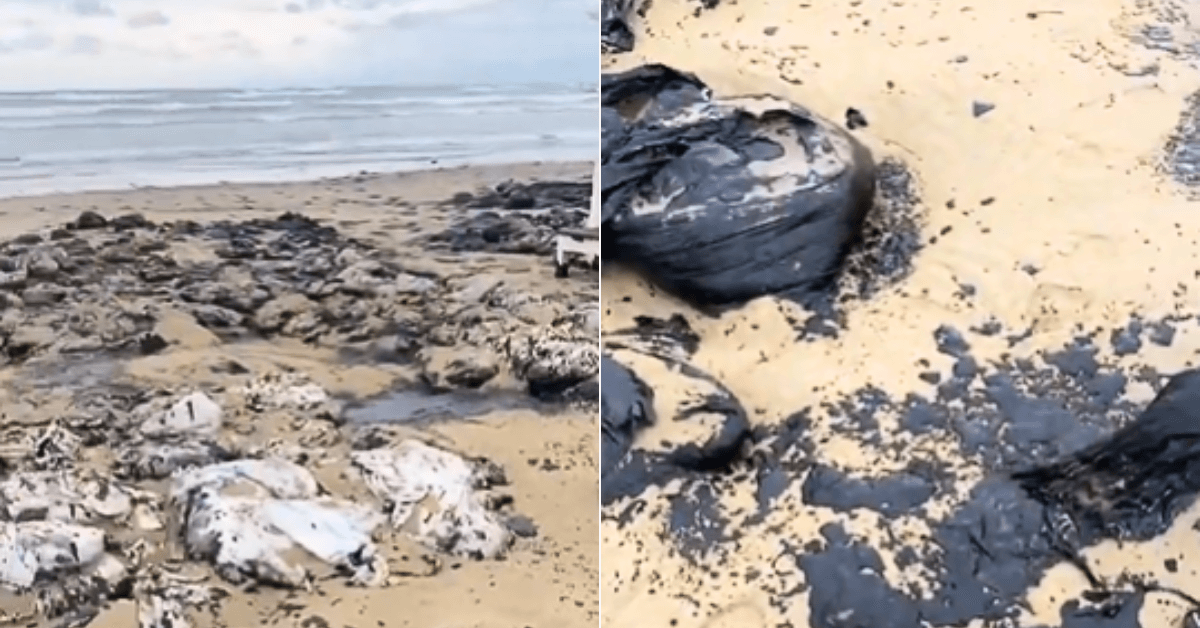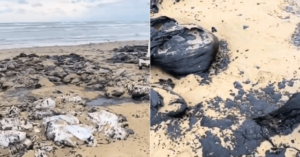
Bosphorus Strait Traffic Suspended Again After Tanker Suffers Mechanical Failure
December 27, 2024
2 Greek Shipping Companies Fined $4.5 Million For Dumping Oily Waste In U.S. Waters
December 27, 2024

A massive oil spill has hit Russia’s Kerch Strait region after two tankers were damaged during a storm, spilling thousands of tonnes of oil into the Black Sea.
The oil has spread across the coastline, causing severe environmental damage and leaving volunteers struggling to clean up the mess.
On December 15, the 50-year-old Russia tanker Volgoneft 212 broke apart near the Kerch Strait, releasing an unknown amount of Russian bunker fuel called mazut. The vessel was carrying 4,300 tonnes of mazut at the time.
Around the same time, another tanker, Volgoneft 239, ran aground and began breaking apart, spilling ever more oil. The total estimated amount of oil spilt from both tankers is 3,700 tonnes.
The oil has washed up along the shore of the Krasnodar region, near the popular tourist town of Anapa. Volunteers have been trying to clean the beaches, and so far, they have collected about 1,700 tonnes of oily sand.
However, the cleanup efforts have been slow and faced multiple challenges. The cleanup has been complicated by bad weather.
The Black Sea coast is grappling with an ecological disaster following an oil spill caused by the sinking of two tankers in the Kerch Strait on December 15. The spill has affected 800 square kilometres, and the tanker continues to leak, according to TASS. Bags of collected oil… pic.twitter.com/fKOWc9ZYpt
— Volcaholic
(@volcaholic1) December 24, 2024
Recently, a storm hit the region, scattering hundreds of bags filled with collected oil waste across the beaches. These bags, meant to contain the oiled sand, were torn open by the waves and the contents spread back into the sea.
Many volunteers and residents have complained about the lack of heavy equipment to help with the cleanup.
Some have reported that the collected waste has not been disposed of properly, with some bags being buried on the beach instead of being moved inland to avoid further damage.
“I thought it was my car releasing smoke, but it was the oil,” said one local volunteer, frustrated with the situation. “We are working to save nature, but it feels like nothing is changing.”
The oil spill is causing serious harm to the environment. Thousands of birds have been found covered in oil, and there have been reports of dead dolphins washing up on the shore.
The oil is also drifting toward the Crimean side of the Kerch Strait, where it could cause even more damage.
One environmental activist warned that the situation in the Feodosia area could be worse than in Anapa. “The sand here is softer and more porous. If the oil gets here, it will be harder to clean up,” the activist said.
Both tankers involved in the spill were over 50 years old, raising concerns about Russia’s use of aging vessels. These older ships are part of Russia’s shadow fleet, a group of tankers used to bypass sanctions and export oil despite international restrictions.
The European Union recently expressed concern about the safety risks posed by these ships, which are often poorly maintained.
Russian authorities have declared a state of emergency and urged the public to join the cleanup efforts. Around 4,000 volunteers are already working on the beaches of Anapa, but many are frustrated with the lack of support.
“The city authorities are working, but we can’t do it without the help of volunteers,” said Russian Foreign Ministry spokesperson Maria Zakharova in a message on Telegram.
Despite the difficulties, the cleanup continues, and the authorities are monitoring the situation closely. This spill is one of the worst environmental disasters to hit the region in recent years.
References: ABC News, Euro News
Source: Maritime Shipping News


